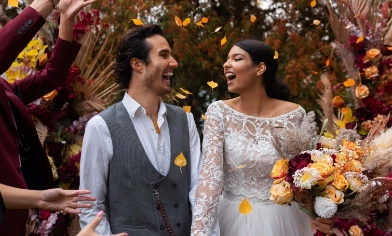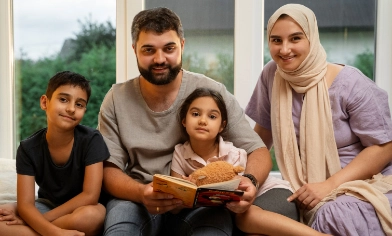In this article

Information correct at the time of publish. Rules and allowances can change. For the latest rules, allowances and guidance on inheritance tax, always check the HMRC website at GOV.UK.
What is inheritance tax?1
When someone dies, everything they owned, like their house, money and belongings, makes up what's called their estate. Inheritance tax (often shortened to IHT) is a tax that might be charged on the value of that estate before it’s passed on to family or friends.
Not every estate has to pay this tax. Whether inheritance tax is due depends on how much the estate is worth and who inherits it. There are rules, limits and exceptions that can make a big difference.
What’s included in an estate?2
Here are the main things that count towards the value of an estate:
-
Homes and property: This includes the person’s main home and any other property they owned
-
Money: Cash in bank accounts, savings accounts and even premium bonds
-
Investments: Things like stocks and shares and savings bonds
-
Personal belongings: Cars, jewellery, furniture and other valuable items
-
Life insurance: If a life insurance policy isn’t written in trust, the payout may be taxed
-
Gifts: Any large gifts given in the seven years before death might also be counted
What isn’t counted as part of your estate?
Before inheritance tax is worked out, some costs are taken away from the estate’s value:
-
Debts: Any money the person still owed, like loans or credit cards
-
Funeral costs: Reasonable expenses for the funeral can usually be deducted
-
Life insurance in trust: If a policy’s held in trust, its payout isn’t part of the estate or taxed
Leave loved ones more when the time comes
How much is the inheritance tax threshold?
Everyone gets a tax-free allowance called the nil-rate band. This is the amount your estate can be worth before any inheritance tax is charged. As of October 2025, the nil-rate band is £325,000.
If your estate is worth less than £325,000, there’s no inheritance tax to pay. If it’s worth more, only the part above that amount is taxed. The standard rate is 40%.
For example, if your estate is worth £500,000:
-
The first £325,000 is tax-free
-
The remaining £175,000 is taxed at 40%
-
That means the tax bill would be £70,000
For the most up to date information about inheritance tax thresholds, please check the HMRC website.
Can the threshold be higher?3
Yes, sometimes you can get a bigger tax-free allowance.
If you leave your house to your children or grandchildren when you die, you might get something extra called the residence nil-rate band. This can give you up to £175,000 more tax-free. So altogether, you might not have to pay tax on up to £500,000.
If you're married or in a civil partnership, you can pass on your unused tax-free allowance to your partner if you die, and vice versa. This can raise the amount the other person can leave without paying inheritance tax up to £650,000. But HMRC must be told within two years after the second person dies. Couples who aren’t married or in a civil partnership can’t use this rule.
Who pays inheritance tax and when?
Inheritance tax is typically paid out of the estate before anything is given to family or other beneficiaries.
The person in charge of the will, called the executor, usually sorts this out. Beneficiaries of your estate usually don’t have to pay tax, unless they earn an income from what you leave them.
If you give gifts, those receiving them may need to pay tax on anything given within the seven years before your death. We’ll look at this seven-year rule shortly.
Inheritance tax must normally be paid within six months of the end of the month when the person died. If it’s late, HMRC will charge interest on the amount that’s due.
When the estate includes property or land, the tax can be paid in yearly instalments for up to 10 years. This makes things easier if the home isn’t sold straight away.

How to reduce inheritance tax
There are ways to cut down or avoid inheritance tax, but it’s important to plan ahead. Using your allowances, thinking about the gifts you give and when, and organising your estate properly can all help.
Some steps are simple, like giving away money each year. Others need more thought, such as putting your life insurance in trust or passing on business assets.
Here are some of the main areas to consider.
Inheritance tax on gifts
Some gifts are automatically free from inheritance tax, such as:
-
Gifts between spouses or civil partners
-
Gifts to charities or political parties
-
Gifts up to £3,000 each tax year (this is called your annual allowance)
-
Small gifts of up to £250 per person each tax year
-
Wedding or civil partnership gifts: up to £5,000 for a child, £2,500 for a grandchild, or £1,000 for anyone else
The 7-year rule on gifts
There’s also what’s known as the seven-year rule.
If you give away money or property worth more than your allowance, and live for seven years after giving it, the gift is usually tax free. But if you die within seven years, tax may still be due.
The closer the gift to your death, the higher the tax:
-
Within 3 years: 40%
-
3–4 years: 32%
-
4–5 years: 24%
-
5–6 years: 16%
-
6–7 years: 8%
This sliding scale is called “taper relief.”
Gifts you still benefit from
If you give something away but continue to use it, it’s called a “gift with reservation.” These gifts still count as part of your estate for tax purposes.
For example, if you transfer your house to a family member but keep living there without paying rent, it’s still treated as yours. The same applies if you give away a painting but keep it on display, or hand over a caravan but continue using it.

Life insurance and inheritance tax
How does life insurance affect inheritance tax?
Life insurance can play an important role in inheritance tax planning. A policy pays out a lump sum when you die, which can help your family cover debts like a mortgage, funeral costs or ongoing living expenses. But whether it’s taxed depends on how the policy is arranged.
If the policy isn’t written in trust
The payout is added to your estate, which can:
-
Push your estate above the tax-free threshold
-
Increase the inheritance tax bill
-
Delay payment until probate (the legal process of sorting out your estate) is complete
If the policy is written in trust
The payout goes directly to your chosen beneficiary. This means it:
-
Doesn’t count as part of your estate
-
Usually isn’t subject to inheritance tax
-
Can be paid quickly, without waiting for probate
How to put your life insurance into a trust
A trust is a legal arrangement that lets you pass money or property to others, while keeping some control over how it’s managed.
To put life insurance into trust, you fill out a trust form with your insurer. You name your beneficiaries (the people who’ll receive the money) and appoint trustees to look after the policy. Trusts can be especially useful if you want to protect funds for children or someone who might struggle to manage their money.
There are different types of trusts, each with their own rules and possible costs. It’s wise to get legal or financial advice to make sure you pick the right one for your situation.
Is death in service taxable?
A death in service benefit is a lump sum paid by an employer if you die while working for them. If it’s paid directly to a named beneficiary, it usually doesn’t count towards your estate. But if it’s paid into your estate, inheritance tax may apply.
Many employers set up these benefits in trust to avoid tax and delays. It’s worth checking how your own scheme is arranged.

Other steps to think about
Inheritance tax and grandchildren
Passing wealth directly to grandchildren can also help reduce inheritance tax. Some allowances apply specifically here:
-
Wedding gifts of up to £2,500 are tax free
-
You can leave up to £500,000 tax free if you pass your home to children or grandchildren
Giving directly to grandchildren can also help skip a generation of tax. Instead of passing assets to your children first (where inheritance tax may be charged twice in future), you can move them directly to grandchildren, making use of allowances and the seven-year rule.
Inheritance tax and business or agricultural assets
Some business and agricultural assets may qualify for special reliefs. These can reduce their value for inheritance tax purposes and, in some cases, remove the tax altogether.
For example, you might be able to claim Business Relief if you own shares in a private company, or Agricultural Relief if you own farmland. These rules can be complex, so it’s usually best to get expert advice if you own assets like these.
Leaving part of your estate to charity
Leaving money to charity can reduce the inheritance tax bill on your estate.
Gifts to charities are usually tax free. On top of that, if you leave at least 10% of your estate to charity, the rate of inheritance tax on the rest of your estate may fall from 40% to 36%1.
This can be a meaningful way to support causes you care about, while also helping your loved ones pay less in tax.
Key takeaways
-
Inheritance tax is charged at 40% on estates above £325,000. Before that, there’s none to pay
-
Leaving a home to children or grandchildren can raise the allowance to £500,000
-
Married couples and civil partners may combine allowances to £1 million
-
Life insurance written in trust avoids inheritance tax on your policy’s payout
-
Careful planning and gifting can reduce or remove the inheritance tax bill
Plan today to protect loved ones tomorrow
Common questions
-
It’s usually paid by the executor using money from the estate. In some cases, people you give gifts to may need to pay tax on them. Check the rules on gift giving covered earlier in this article.
-
You can normally leave up to £325,000 tax free. This rises to £500,000 if you leave your home to children or grandchildren.
-
The standard rate is 40% on anything above the tax-free threshold. It can reduce to 36% if 10% or more of the estate is left to charity.
-
Inheritance tax and life insurance might be linked, with tax due on your policy payout, depending on how it’s set up and managed. If it’s written in trust, the lump sum the policy pays out goes straight to your chosen beneficiary and isn’t usually taxed. If it isn’t in trust, the payout counts as part of the estate so tax may be due on it.
- Show more
-
You can reduce or avoid inheritance tax by using allowances, giving gifts, putting life insurance in trust and leaving money to charity.
-
You can give up to £3,000 each year without it being taxed. You can also gift £250 per person annually, make wedding gifts, or give regular payments from your income. Check the rules on gift giving earlier in this article.
-
If you die within seven years of gifting money or property, it will still count towards the inheritance tax on your estate. The longer you live after making the gift, the less tax is due. Gifts given over seven years before you die aren’t usually taxed.
-
It depends how the scheme is set up. If your death in service benefit is written into trust, it’s not usually taxed. If it’s paid into your estate, it might be. Check with your employer or scheme provider.
-
If you live in another country, you usually only pay UK inheritance tax on things you own in the UK, like a house or money in a UK bank. But if you’ve lived in the UK for 15 out of the last 20 years or your main home is still in the UK, the UK might still count you as living there for tax purposes. Some countries have special agreements with the UK so you don’t get taxed twice: once by the UK and once by the country you live in. Rules vary by country and individual circumstances. Seek professional advice if you have assets abroad. Read more information on the GOV.UK website.
-
To learn more about inheritance tax, like how much you can give away and what rules apply, visit the GOV.UK website.
Our life cover products
-
Life insurance
Choose between level, decreasing or increasing term insurance, each designed to offer you peace of mind based on your circumstances.
-
Over 50s life cover
If you're aged between 50 and 80, we could help you leave a cash sum for your family or towards your funeral costs.
Related products and guides

Common law partnerships: how to protect each other financially
If you’re not married or in a civil partnership, your partner might face financial challenges they otherwise wouldn’t if you died. This guide explains what you can do to help protect them.

Over 60s life insurance
Turning 60 is a special milestone, but it’s also a good time to think about how you can protect your loved ones in the future.

Life assurance vs life insurance
What is life assurance and is it the same as life insurance? Our guide explains it all.

How much is a funeral in the UK?
No one really likes to think about their funeral. But it’s important to because they can be expensive.

What do I need to apply for life insurance and how does the process work?
Thinking about life insurance? Here’s what you’ll need to apply, how long it takes and how the process works from start to finish.

What are the benefits of life insurance?
Life insurance can give your family financial support if you pass away during the policy term. As well as providing peace of mind, it can help cover debts and everyday costs so life can go on.

Why life insurance still matters, even in a cost-of-living crisis
With bills going up, it’s natural to look for ways to cut costs. But cancelling your life insurance could lead to bigger problems later. Here’s why keeping your cover matters and how Post Office can help.

Can you write your own will?
A properly written will protects your loved ones and helps make sure provisions you’ve made like life insurance get paid to the right person if you die.
Joint vs single life insurance policies for couples: what’s best for you?
Choosing the right life insurance policy as a couple can be challenging. Should you apply for one joint policy or take out separate single policies instead?

What is life insurance?
Life insurance can offer your loved ones peace of mind and financial security if you pass away or become critically ill.

Death in service vs life insurance
Death in service cover is a useful employee benefit but relying on it alone could put your family at risk financially. Find out how it compares to life insurance and why it’s a good idea to have both.

Life insurance and critical illness cover at 50: Protecting your future while you enjoy new adventures
Turning 50 is a great time to try new things. The right life cover can help you enjoy travel, hobbies and big life changes without worry.

Understanding mortgage life insurance
If you want to leave your loved ones financial protection for your home, even if you’re not there to help pay the mortgage, you may want to take out mortgage life insurance.

6 reasons why you need life insurance
It seems there are certain events in people’s life that prompt them to buy life insurance.

The nation's relationship with life insurance
For many people, life insurance is an important way to protect their loved ones. But how many of us actually have it? And how much do people really know about this kind of cover?

Life insurance for self-employed people
Life insurance is more than just a safety net. It can be a smart investment in your family’s future and your business’s continuity, especially if you’re self-employed.

Family life insurance: protecting your loved ones
Your family is unique. Protecting them from life’s uncertainties is important. Life insurance offers a way to provide financial security for your loved ones if something happens to you.

Teen travel: holiday ideas for teenagers and tips for parents
Travel can help teenagers grow and discover new places. This guide shares the best trips for teens, advice for those travelling independently for the first time, plus tips for parents too.

10 tips for keeping kids safe on holiday
We all know the feeling – getting to the airport, then a wave of panic comes over you. Did you remember your passport? What time's the flight? And where on earth did you put the kids?

Family travel insurance
Going on a trip with your family is a great way to spend time together. It could be a holiday, a weekend away or a big trip abroad.
Footnotes
Check GOV.UK for further guidance on the referenced points:
2 Valuing the estate of someone who’s died
3 Transferring an unused basic threshold for inheritance tax